![]()
Update 26.11.2024:
Aufgrund vieler Anfragen nach der Platine und weil vielleicht nicht jeder daran interessiert ist, sie selber zu zeichnen, stelle ich die Gerberdaten zum Dowload zur Verfügung:
pylontec_mqttinterface_v1.0_gerber
Wer eine Photovoltaik Anlage in seinem Eigenheim aufgebaut hat, verwendet vielleicht sogar einen Energiespeicher. In diesem Beispiel handelt es sich um eine Offgrid Anlage, die mit zwei Modulen des Herstellers Pylontech ausgestattet ist. Die Pylontech Akkus der Type US3000C haben eine Ausgangs Spannung von 48V. Die Nennkapazität beträgt 3500Wh. Die verbauten Zellen sind LiFePO4 Zellen und die nutzbare Kapazität ist laut Datenblatt mit 3374Wh angegeben. Die Akkus sind so gebaut, dass sie mit weiteren Pylontech-Akkus parallelgeschaltet werden können. Das intern verbaute BMS (BatterieManagementSystem) kommuniziert über eine sogenannte „Link“ Schnittstelle mit den anderen Pylontech Batteriemodulen. Ein als „Master“ konfigurierter Akku erledigt den Datenaustausch zum Wechselrichter. Hier stellt Pylontech den CAN- oder RS485 Bus als Schnittstelle zur Verfügung. Will man jedoch Informationen über die einzelnen Zellen (Spannungen, Ströme, Ladungen, Temperaturen etc.) haben, so gibt es an jedem Modul noch eine Schnittstelle mit der Bezeichnung „Console“. Das ist eine RS232 Schnittstelle über die man direkt mit dem BMS des Akkus kommunizieren kann. Dieser Port wird auch genutzt, um die Firmware des BMS zu aktualisieren. Ich rate aber DRINGEND davon ab, mit Firmwareupdates und Flashsoftware daran herum zu spielen. Das ist dem Hersteller oder dem Haftungsträger vorbehalten.
Da man über diese Schnittstelle aber auch einiges an Informationen über die im Akku verbauten Zellen erfährt, ist das ein interessanter Zugang. So hatte ich anfangs einen Laptop mit einem Terminal angeschlossen und konnte so die einzelnen Zellenspannungen und vor allem den evtl. unterschiedlichen Ladezustand der parallel geschalteten Module entdecken und monitoren. So dachte ich mir, wäre es doch eine gute Idee, wenn man diese Infos in seiner Hausautomatisierung zur Verfügung hat und dort visualisieren und für Steuerungszwecke nutzen kann.
Da für uns Freaks und Technikinteressierte Begriffe wie Homeassistant, Docker, Proxmox, HomeMatic, NodeRed usw. durchaus bekannt sind, dachte ich mir, diese Daten sollen auch im Homeassistant zu Entitäten werden. So war schnell wieder ein kleines neues Projekt geschaffen. Mein Plan: die Daten der Serien Schnittstelle auslesen und per MQTT an den Homeassistant senden.
Bevor ich mich nun aber mit dem Zerlegen der Datenstrings, die über den seriellen Port herauspurzeln beschäftige, bemühte ich zuerst einmal die Suchmaschinen. Vielleicht hat sich ja schon jemand anderes mit diesem Thema beschäftigt. Und genau so war es auch. Auf GitHub wurde ich unter dem Begriff „pylontec2mqtt“ fündig. Unter https://github.com/irekzielinski/Pylontech-Battery-Monitoring ist ein Projekt gehostet, das mittels ESP8266 die seriellen Daten vom Port abholt und per MQTT und Wifi zum Homeassistant Server sendet. Ein Fork mit einer Weiterentwicklung dieses Projektes ist unter https://github.com/hidaba/PylontechMonitoring zu finden.
Warum ich das Projekt trotz des einfachen Nachbaus hier im Blog veröffentliche? Ich habe die Schaltung ein wenig optimiert und in ein Layout gepackt und den Code etwas angepasst. Das Ergebnis möchte ich hier teilen. Mir war es in wichtig, einen vernünftigen Aufbau auf einer Platine zu haben, die mit einem USB A-B Kabel für die Spannungsversorgung und einem LAN-RJ45 Kabel für die Datenverbindung angesteckt wird. Dabei wollte ich eine „solide“ USB Steckverbindung verwenden (nicht die Fragilen Mini- oder Mikro USB Steckverbindungen)
Auf einer Lochrasterplatine und mit den üblichen Entwicklungsplatinen habe ich mir auf die Schnelle ein Funktionsmuster „zusammen gestrickt“ um darauf die Software anpassen zu können.

So habe ich zuerst aus den Skizzen im Git-Projekt einen Schaltplan erstellt. An der „Console“ Schnittstelle liegt ein „echter“ RS232 Pegel an, der über den MAX3232 IC auf eine 5V TTL umgesetzt wird. Mit dem BSS123 FET wird für die Signale RX und TX je ein Pegelwandler auf 3.3V realisiert.
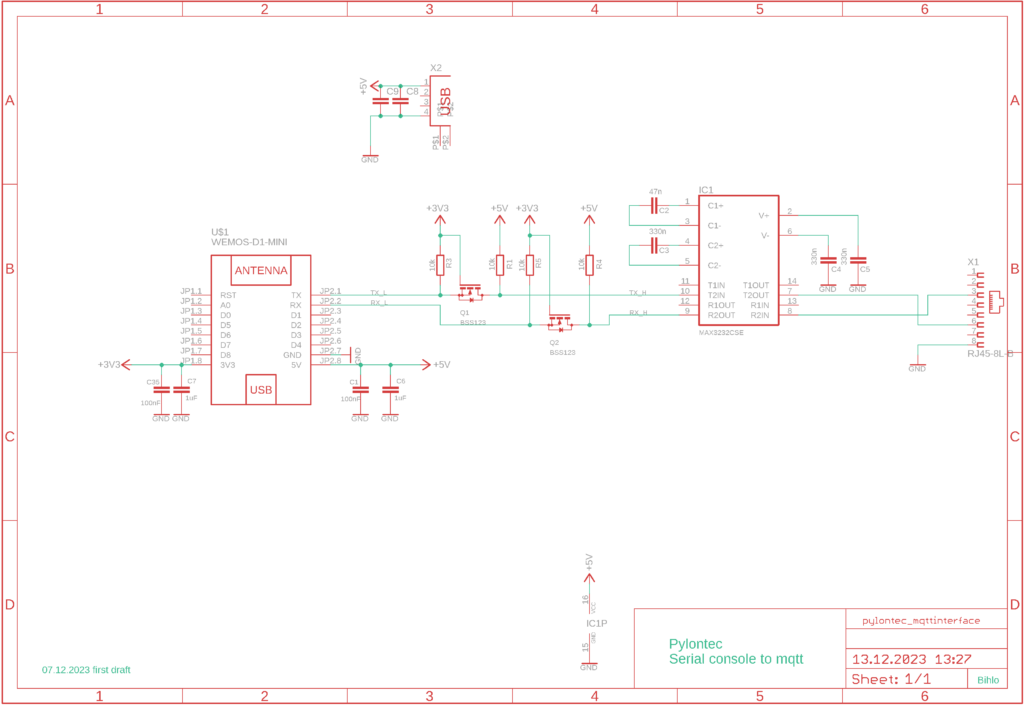
Diese 3.3V TTL Pegel verarbeitet der ESP8266 in Form des Wemos D1Mini oder WemosD1Pro Entwicklungsboard, das auf die Platine aufgesteckt wird. Die gesamte Konstruktion habe ich dann in ein kleines Kunststoffgehäuse gepackt, das bequem über die Lan und USB Kabel mit dem Pylontec und einer USB Spannungsquelle zu verbinden ist.
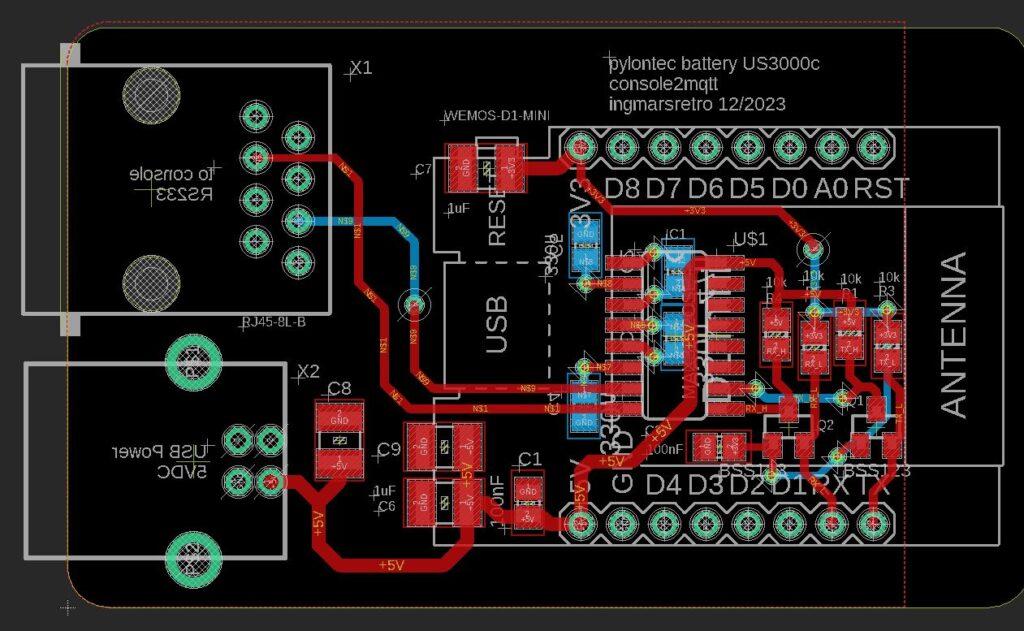
Im Bild oben ist der Layout Entwurf dargestellt. Die Platine und die Lage der Bauteile wurden vor der Fertigung nochmals mit der Vorschau überprüft und dann beim Hersteller des Vertrauens bestellt.
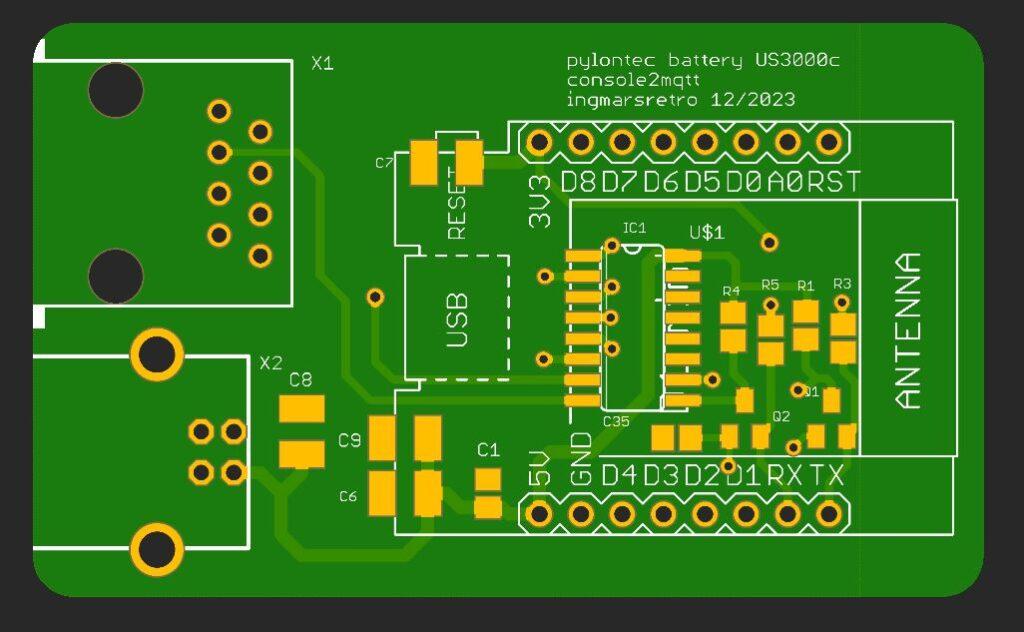
Nach kaum zwei Wochen Wartezeit hielt ich dann die Leeren Platinen in Händen und konnte sie mit den Bauteilen bestücken.
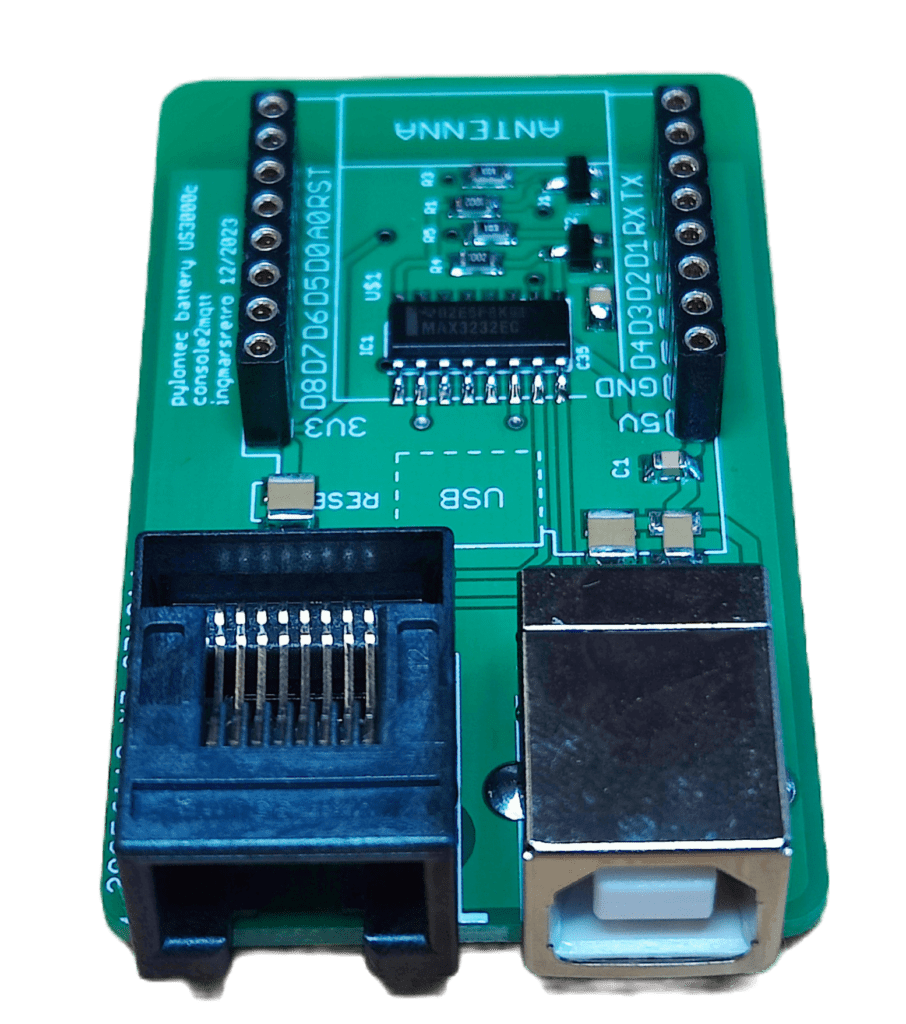
Im Bild oben ist die fertig bestückte Platine zu sehen. Hier fehlt nur mehr das Wemosboard mit dem ESP.

Schlussendlich habe ich einen WemosD1 Pro aufgesteckt, da dieser die Möglichkeit bietet, eine externe WiFi Antenne anzuschließen und somit eine vernünftige Funkreichweite zu erhalten.
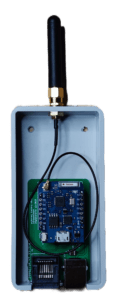 Nach dem Aufspielen der Software und der Inbetriebnahme ist der Webserver des Wemos unter der im Code angegebenen IP Adresse erreichbar. Hier kann auch gleich geprüft werden, ob der Pylontech Akku mit dem Wemos kommuniziert. Das Ergebnis sieht dann wie folgt aus.
Nach dem Aufspielen der Software und der Inbetriebnahme ist der Webserver des Wemos unter der im Code angegebenen IP Adresse erreichbar. Hier kann auch gleich geprüft werden, ob der Pylontech Akku mit dem Wemos kommuniziert. Das Ergebnis sieht dann wie folgt aus.
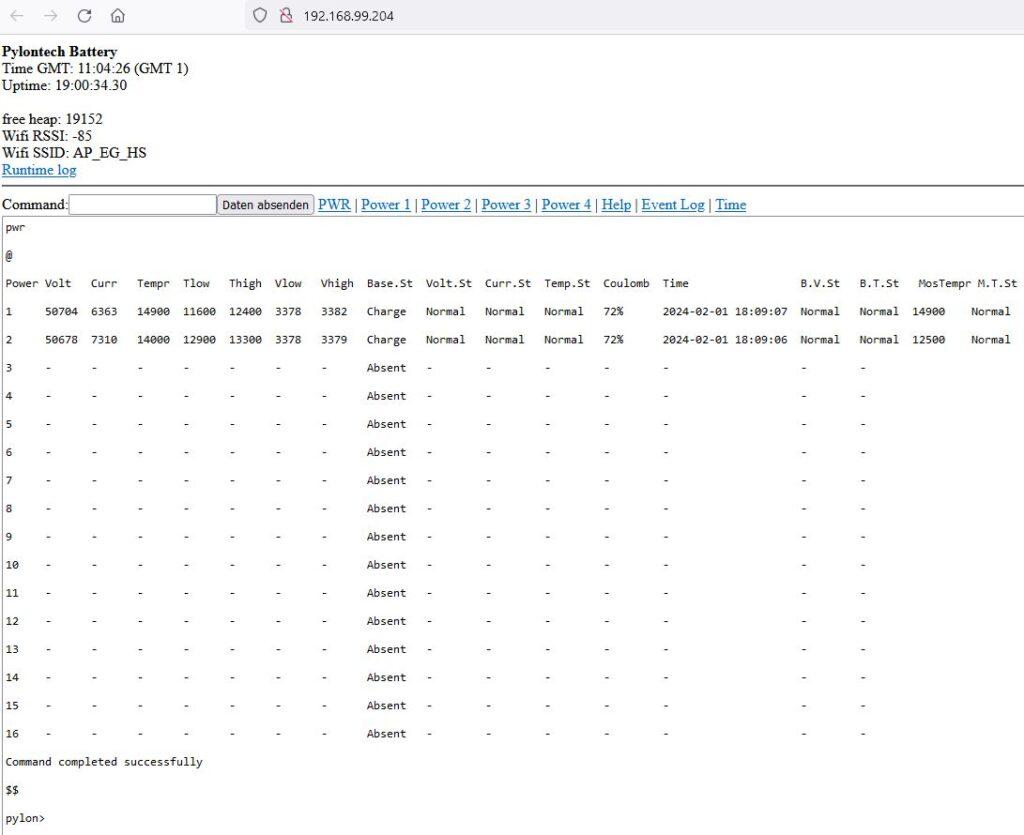
Hier ist zu erkennen, dass beide Akkumodule korrekt erkannt werden. Im nächsten Schritt wird überprüft, ob über das MQTT Protokol Nachrichten versandt werden. Die IP Adresse des MQTT Brokers ist auch im Code des Wemos festzulegen. Ich habe in meinem Aufbau den MQTT-Explorer im Homeassistant eingerichtet, um schnell und einfach die MQTT Funktionen prüfen zu können.
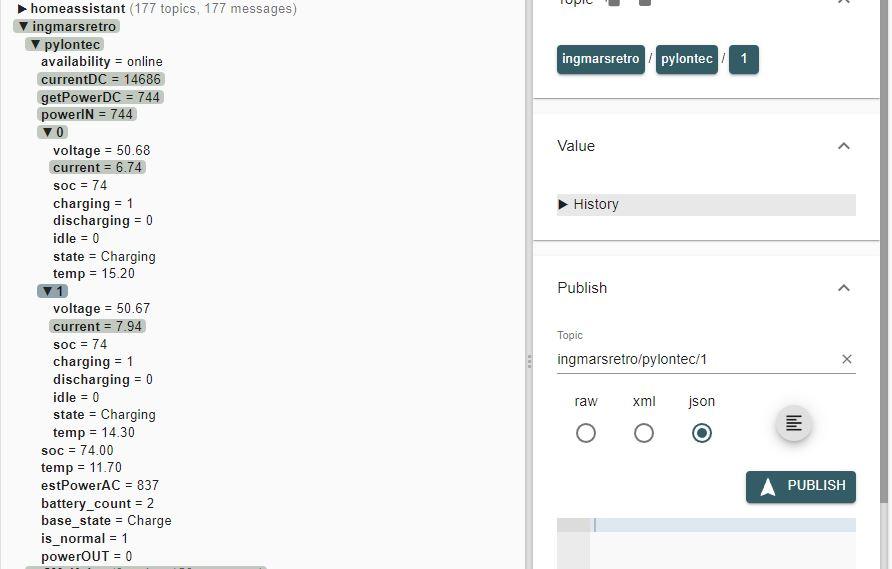
Im Bild oben ist zu erkennen, dass auch die Daten über MQTT korrekt ankommen. Jetzt ist es nur mehr notwendig, im Homeassistant ein Sensor yaml file anzulegen, um die topics im als Entitäten zur Verfügung zu stellen. Dazu habe ich im configuration.yaml folgenden code hinzugefügt:
mqtt:
sensor:
#Pylontec Akku Serial Readout (ESP32 192.168.xxx.yyy)
- state_topic: "ingmarsretro/pylontec/ESP_WiFi_RSSI"
name: "Pylontec_RSSI"
unit_of_measurement: dB
- state_topic: "ingmarsretro/pylontec/availability"
name: "Pylontec_Status"
- state_topic: "ingmarsretro/pylontec/currentDC"
name: "DC-Strom"
unit_of_measurement: "mA"
- state_topic: "ingmarsretro/pylontec/getPowerDC"
name: "getPower DC"
unit_of_measurement: "W"
- state_topic: "ingmarsretro/pylontec/powerIN"
name: "Power IN"
unit_of_measurement: "W"
- state_topic: "ingmarsretro/pylontec/estPowerAC"
name: "Pylontec_estPowerAC"
unit_of_measurement: Watt
- state_topic: "ingmarsretro/pylontec/soc"
name: "Pylontec_SOC"
unit_of_measurement: "%"
- state_topic: "ingmarsretro/pylontec/temp"
name: "Pylontec_temperature"
unit_of_measurement: "°C"
- state_topic: "ingmarsretro/pylontec/battery_count"
name: "Pylontec_BatteryCount"
unit_of_measurement: "pcs"
- state_topic: "ingmarsretro/pylontec/base_state"
name: "Pylontec_BaseState"
- state_topic: "ingmarsretro/pylontec/is_normal"
name: "Pylontec_is_normal"
- state_topic: "ingmarsretro/pylontec/powerOUT"
name: "Pylontec_powerOUT"
unit_of_measurement: Watt
# Pylontech battery module 0
- state_topic: "ingmarsretro/pylontec/0/current"
name: "Pylontec_Battery0_current"
unit_of_measurement: "A"
- state_topic: "ingmarsretro/pylontec/0/voltage"
name: "Pylontec_Battery0_voltage"
unit_of_measurement: "V"
- state_topic: "ingmarsretro/pylontec/0/soc"
name: "Pylontec_Battery0_soc"
unit_of_measurement: "%"
- state_topic: "ingmarsretro/pylontec/0/charging"
name: "Pylontec_Battery0_charging"
- state_topic: "ingmarsretro/pylontec/0/discharging"
name: "Pylontec_Battery0_discharging"
- state_topic: "ingmarsretro/pylontec/0/idle"
name: "Pylontec_Battery0_idle"
- state_topic: "ingmarsretro/pylontec/0/state"
name: "Pylontec_Battery0_state"
- state_topic: "ingmarsretro/pylontec/0/temp"
name: "Pylontec_Battery0_temp"
unit_of_measurement: "°C"
# Pylontech battery module 1
- state_topic: "ingmarsretro/pylontec/1/current"
name: "Pylontec_Battery1_current"
unit_of_measurement: "A"
- state_topic: "ingmarsretro/pylontec/1/voltage"
name: "Pylontec_Battery1_voltage"
unit_of_measurement: "V"
- state_topic: "ingmarsretro/pylontec/1/soc"
name: "Pylontec_Battery1_soc"
unit_of_measurement: "%"
- state_topic: "ingmarsretro/pylontec/1/charging"
name: "Pylontec_Battery1_charging"
- state_topic: "ingmarsretro/pylontec/1/discharging"
name: "Pylontec_Battery1_discharging"
- state_topic: "ingmarsretro/pylontec/1/idle"
name: "Pylontec_Battery1_idle"
- state_topic: "ingmarsretro/pylontec/1/state"
name: "Pylontec_Battery1_state"
- state_topic: "ingmarsretro/pylontec/1/temp"
name: "Pylontec_Battery1_temp"
unit_of_measurement: "°C"
Auf der Homeassistant Website könnte die Visualisierung dann beispielsweise so aussehen:
Zu guter Letzt poste ich unten noch den angepassten Code. Die zum Kompilieren notwendigen Libraries und weiteren Infos sind den oben angeführten GitHub Links zu entnehmen.
#include <ESP8266WiFi.h>
#include <ESP8266mDNS.h>
#include <ArduinoOTA.h>
#include <ESP8266WebServer.h>
#include <circular_log.h>
#include <ArduinoJson.h>
#include <NTPClient.h>
#include <ESP8266TimerInterrupt.h>
//+++ START CONFIGURATION +++
//IMPORTANT: Specify your WIFI settings:
#define WIFI_SSID "wifiname"
#define WIFI_PASS deinpasswort1234"
#define WIFI_HOSTNAME "mppsolar-pylontec"
//Uncomment for static ip configuration
#define STATIC_IP
IPAddress local_IP(192, 168, xxx, yyy);
IPAddress subnet(255, 255, 255, 0);
IPAddress gateway(192, 168, xxx, zzz);
IPAddress primaryDNS(192, 168, xxx, zzz);
//Uncomment for authentication page
//#define AUTHENTICATION
//set http Authentication
const char* www_username = "admin";
const char* www_password = "password";
//IMPORTANT: Uncomment this line if you want to enable MQTT (and fill correct MQTT_ values below):
#define ENABLE_MQTT
// Set offset time in seconds to adjust for your timezone, for example:
// GMT +1 = 3600
// GMT +1 = 7200
// GMT +8 = 28800
// GMT -1 = -3600
// GMT 0 = 0
#define GMT 3600
//NOTE 1: if you want to change what is pushed via MQTT - edit function: pushBatteryDataToMqtt.
//NOTE 2: MQTT_TOPIC_ROOT is where battery will push MQTT topics. For example "soc" will be pushed to: "home/grid_battery/soc"
#define MQTT_SERVER "192.168.xx.broker"
#define MQTT_PORT 1883
#define MQTT_USER ""
#define MQTT_PASSWORD ""
#define MQTT_TOPIC_ROOT "ingmarsretro/pylontec/" //this is where mqtt data will be pushed
#define MQTT_PUSH_FREQ_SEC 2 //maximum mqtt update frequency in seconds
//+++ END CONFIGURATION +++
#ifdef ENABLE_MQTT
#include <PubSubClient.h>
WiFiClient espClient;
PubSubClient mqttClient(espClient);
#endif //ENABLE_MQTT
//text response
char g_szRecvBuff[7000];
const long utcOffsetInSeconds = GMT;
char daysOfTheWeek[7][12] = {"Sunday", "Monday", "Tuesday", "Wednesday", "Thursday", "Friday", "Saturday"};
// Define NTP Client to get time
WiFiUDP ntpUDP;
NTPClient timeClient(ntpUDP, "pool.ntp.org", utcOffsetInSeconds);
ESP8266WebServer server(80);
circular_log<7000> g_log;
bool ntpTimeReceived = false;
int g_baudRate = 0;
void Log(const char* msg)
{
g_log.Log(msg);
}
//Define Interrupt Timer to Calculate Power meter every second (kWh)
#define USING_TIM_DIV1 true // for shortest and most accurate timer
ESP8266Timer ITimer;
bool setInterval(unsigned long interval, timer_callback callback); // interval (in microseconds)
#define TIMER_INTERVAL_MS 1000
//Global Variables for the Power Meter - accessible from the calculating interrupt und from main
unsigned long powerIN = 0; //WS gone in to the BAttery
unsigned long powerOUT = 0; //WS gone out of the Battery
//Global Variables for the Power Meter - Überlauf
unsigned long powerINWh = 0; //WS gone in to the BAttery
unsigned long powerOUTWh = 0; //WS gone out of the Battery
void setup() {
memset(g_szRecvBuff, 0, sizeof(g_szRecvBuff)); //clean variable
pinMode(LED_BUILTIN, OUTPUT);
digitalWrite(LED_BUILTIN, HIGH);//high is off
// put your setup code here, to run once:
WiFi.mode(WIFI_STA);
WiFi.persistent(false); //our credentialss are hardcoded, so we don't need ESP saving those each boot (will save on flash wear)
WiFi.hostname(WIFI_HOSTNAME);
#ifdef STATIC_IP
WiFi.config(local_IP, gateway, subnet, primaryDNS);
#endif
WiFi.begin(WIFI_SSID, WIFI_PASS);
for(int ix=0; ix<10; ix++)
{
Log("Wait for WIFI Connection");
if(WiFi.status() == WL_CONNECTED)
{
break;
}
delay(1000);
}
ArduinoOTA.setHostname(WIFI_HOSTNAME);
ArduinoOTA.begin();
server.on("/", handleRoot);
server.on("/log", handleLog);
server.on("/req", handleReq);
server.on("/jsonOut", handleJsonOut);
server.on("/reboot", [](){
#ifdef AUTHENTICATION
if (!server.authenticate(www_username, www_password)) {
return server.requestAuthentication();
}
#endif
ESP.restart();
});
server.begin();
timeClient.begin();
#ifdef ENABLE_MQTT
mqttClient.setServer(MQTT_SERVER, MQTT_PORT);
#endif
Log("Boot event");
}
void handleLog()
{
#ifdef AUTHENTICATION
if (!server.authenticate(www_username, www_password)) {
return server.requestAuthentication();
}
#endif
server.send(200, "text/html", g_log.c_str());
}
void switchBaud(int newRate)
{
if(g_baudRate == newRate)
{
return;
}
if(g_baudRate != 0)
{
Serial.flush();
delay(20);
Serial.end();
delay(20);
}
char szMsg[50];
snprintf(szMsg, sizeof(szMsg)-1, "New baud: %d", newRate);
Log(szMsg);
Serial.begin(newRate);
g_baudRate = newRate;
delay(20);
}
void waitForSerial()
{
for(int ix=0; ix<150;ix++)
{
if(Serial.available()) break;
delay(10);
}
}
int readFromSerial()
{
memset(g_szRecvBuff, 0, sizeof(g_szRecvBuff));
int recvBuffLen = 0;
bool foundTerminator = true;
waitForSerial();
while(Serial.available())
{
char szResponse[256] = "";
const int readNow = Serial.readBytesUntil('>', szResponse, sizeof(szResponse)-1); //all commands terminate with "$$\r\n\rpylon>" (no new line at the end)
if(readNow > 0 &&
szResponse[0] != '\0')
{
if(readNow + recvBuffLen + 1 >= (int)(sizeof(g_szRecvBuff)))
{
Log("WARNING: Read too much data on the console!");
break;
}
strcat(g_szRecvBuff, szResponse);
recvBuffLen += readNow;
if(strstr(g_szRecvBuff, "$$\r\n\rpylon"))
{
strcat(g_szRecvBuff, ">"); //readBytesUntil will skip this, so re-add
foundTerminator = true;
break; //found end of the string
}
if(strstr(g_szRecvBuff, "Press [Enter] to be continued,other key to exit"))
{
//we need to send new line character so battery continues the output
Serial.write("\r");
}
waitForSerial();
}
}
if(recvBuffLen > 0 )
{
if(foundTerminator == false)
{
Log("Failed to find pylon> terminator");
}
}
return recvBuffLen;
}
bool readFromSerialAndSendResponse()
{
const int recvBuffLen = readFromSerial();
if(recvBuffLen > 0)
{
server.sendContent(g_szRecvBuff);
return true;
}
return false;
}
bool sendCommandAndReadSerialResponse(const char* pszCommand)
{
switchBaud(115200);
if(pszCommand[0] != '\0')
{
Serial.write(pszCommand);
}
Serial.write("\n");
const int recvBuffLen = readFromSerial();
if(recvBuffLen > 0)
{
return true;
}
//wake up console and try again:
wakeUpConsole();
if(pszCommand[0] != '\0')
{
Serial.write(pszCommand);
}
Serial.write("\n");
return readFromSerial() > 0;
}
void handleReq()
{
#ifdef AUTHENTICATION
if (!server.authenticate(www_username, www_password)) {
return server.requestAuthentication();
}
#endif
bool respOK;
if(server.hasArg("code") == false)
{
respOK = sendCommandAndReadSerialResponse("");
}
else
{
respOK = sendCommandAndReadSerialResponse(server.arg("code").c_str());
}
handleRoot();
}
void handleJsonOut()
{
#ifdef AUTHENTICATION
if (!server.authenticate(www_username, www_password)) {
return server.requestAuthentication();
}
#endif
if(sendCommandAndReadSerialResponse("pwr") == false)
{
server.send(500, "text/plain", "Failed to get response to 'pwr' command");
return;
}
parsePwrResponse(g_szRecvBuff);
prepareJsonOutput(g_szRecvBuff, sizeof(g_szRecvBuff));
server.send(200, "application/json", g_szRecvBuff);
}
void handleRoot() {
#ifdef AUTHENTICATION
if (!server.authenticate(www_username, www_password)) {
return server.requestAuthentication();
}
#endif
timeClient.update(); //get ntp datetime
unsigned long days = 0, hours = 0, minutes = 0;
unsigned long val = os_getCurrentTimeSec();
days = val / (3600*24);
val -= days * (3600*24);
hours = val / 3600;
val -= hours * 3600;
minutes = val / 60;
val -= minutes*60;
time_t epochTime = timeClient.getEpochTime();
String formattedTime = timeClient.getFormattedTime();
//Get a time structure
struct tm *ptm = gmtime ((time_t *)&epochTime);
int currentMonth = ptm->tm_mon+1;
static char szTmp[9500] = "";
long timezone= GMT / 3600;
snprintf(szTmp, sizeof(szTmp)-1, "<html><b>Pylontech Battery</b><br>Time GMT: %s (%s %d)<br>Uptime: %02d:%02d:%02d.%02d<br><br>free heap: %u<br>Wifi RSSI: %d<BR>Wifi SSID: %s",
formattedTime, "GMT ", timezone,
(int)days, (int)hours, (int)minutes, (int)val,
ESP.getFreeHeap(), WiFi.RSSI(), WiFi.SSID().c_str());
strncat(szTmp, "<BR><a href='/log'>Runtime log</a><HR>", sizeof(szTmp)-1);
strncat(szTmp, "<form action='/req' method='get'>Command:<input type='text' name='code'/><input type='submit'> <a href='/req?code=pwr'>PWR</a> | <a href='/req?code=pwr%201'>Power 1</a> | <a href='/req?code=pwr%202'>Power 2</a> | <a href='/req?code=pwr%203'>Power 3</a> | <a href='/req?code=pwr%204'>Power 4</a> | <a href='/req?code=help'>Help</a> | <a href='/req?code=log'>Event Log</a> | <a href='/req?code=time'>Time</a><br>", sizeof(szTmp)-1);
//strncat(szTmp, "<form action='/req' method='get'>Command:<input type='text' name='code'/><input type='submit'><a href='/req?code=pwr'>Power</a> | <a href='/req?code=help'>Help</a> | <a href='/req?code=log'>Event Log</a> | <a href='/req?code=time'>Time</a><br>", sizeof(szTmp)-1);
strncat(szTmp, "<textarea rows='80' cols='180'>", sizeof(szTmp)-1);
//strncat(szTmp, "<textarea rows='45' cols='180'>", sizeof(szTmp)-1);
strncat(szTmp, g_szRecvBuff, sizeof(szTmp)-1);
strncat(szTmp, "</textarea></form>", sizeof(szTmp)-1);
strncat(szTmp, "</html>", sizeof(szTmp)-1);
//send page
server.send(200, "text/html", szTmp);
}
unsigned long os_getCurrentTimeSec()
{
static unsigned int wrapCnt = 0;
static unsigned long lastVal = 0;
unsigned long currentVal = millis();
if(currentVal < lastVal)
{
wrapCnt++;
}
lastVal = currentVal;
unsigned long seconds = currentVal/1000;
//millis will wrap each 50 days, as we are interested only in seconds, let's keep the wrap counter
return (wrapCnt*4294967) + seconds;
}
void wakeUpConsole()
{
switchBaud(1200);
//byte wakeUpBuff[] = {0x7E, 0x32, 0x30, 0x30, 0x31, 0x34, 0x36, 0x38, 0x32, 0x43, 0x30, 0x30, 0x34, 0x38, 0x35, 0x32, 0x30, 0x46, 0x43, 0x43, 0x33, 0x0D};
//Serial.write(wakeUpBuff, sizeof(wakeUpBuff));
Serial.write("~20014682C0048520FCC3\r");
delay(1000);
byte newLineBuff[] = {0x0E, 0x0A};
switchBaud(115200);
for(int ix=0; ix<10; ix++)
{
Serial.write(newLineBuff, sizeof(newLineBuff));
delay(1000);
if(Serial.available())
{
while(Serial.available())
{
Serial.read();
}
break;
}
}
}
#define MAX_PYLON_BATTERIES 8
struct pylonBattery
{
bool isPresent;
long soc; //Coulomb in %
long voltage; //in mW
long current; //in mA, negative value is discharge
long tempr; //temp of case or BMS?
long cellTempLow;
long cellTempHigh;
long cellVoltLow;
long cellVoltHigh;
char baseState[9]; //Charge | Dischg | Idle
char voltageState[9]; //Normal
char currentState[9]; //Normal
char tempState[9]; //Normal
char time[20]; //2019-06-08 04:00:29
char b_v_st[9]; //Normal (battery voltage?)
char b_t_st[9]; //Normal (battery temperature?)
bool isCharging() const { return strcmp(baseState, "Charge") == 0; }
bool isDischarging() const { return strcmp(baseState, "Dischg") == 0; }
bool isIdle() const { return strcmp(baseState, "Idle") == 0; }
bool isBalancing() const { return strcmp(baseState, "Balance") == 0; }
bool isNormal() const
{
if(isCharging() == false &&
isDischarging() == false &&
isIdle() == false &&
isBalancing() == false)
{
return false; //base state looks wrong!
}
return strcmp(voltageState, "Normal") == 0 &&
strcmp(currentState, "Normal") == 0 &&
strcmp(tempState, "Normal") == 0 &&
strcmp(b_v_st, "Normal") == 0 &&
strcmp(b_t_st, "Normal") == 0 ;
}
};
struct batteryStack
{
int batteryCount;
int soc; //in %, if charging: average SOC, otherwise: lowest SOC
int temp; //in mC, if highest temp is > 15C, this will show the highest temp, otherwise the lowest
long currentDC; //mAh current going in or out of the battery
long avgVoltage; //in mV
char baseState[9]; //Charge | Dischg | Idle | Balance | Alarm!
pylonBattery batts[MAX_PYLON_BATTERIES];
bool isNormal() const
{
for(int ix=0; ix<MAX_PYLON_BATTERIES; ix++)
{
if(batts[ix].isPresent &&
batts[ix].isNormal() == false)
{
return false;
}
}
return true;
}
//in Wh
long getPowerDC() const
{
return (long)(((double)currentDC/1000.0)*((double)avgVoltage/1000.0));
}
// power in Wh in charge
float powerIN() const
{
if (currentDC > 0) {
return (float)(((double)currentDC/1000.0)*((double)avgVoltage/1000.0));
} else {
return (float)(0);
}
}
// power in Wh in discharge
float powerOUT() const
{
if (currentDC < 0) {
return (float)(((double)currentDC/1000.0)*((double)avgVoltage/1000.0)*-1);
} else {
return (float)(0);
}
}
//Wh estimated current on AC side (taking into account Sofar ME3000SP losses)
long getEstPowerAc() const
{
double powerDC = (double)getPowerDC();
if(powerDC == 0)
{
return 0;
}
else if(powerDC < 0)
{
//we are discharging, on AC side we will see less power due to losses
if(powerDC < -1000)
{
return (long)(powerDC*0.94);
}
else if(powerDC < -600)
{
return (long)(powerDC*0.90);
}
else
{
return (long)(powerDC*0.87);
}
}
else
{
//we are charging, on AC side we will have more power due to losses
if(powerDC > 1000)
{
return (long)(powerDC*1.06);
}
else if(powerDC > 600)
{
return (long)(powerDC*1.1);
}
else
{
return (long)(powerDC*1.13);
}
}
}
};
batteryStack g_stack;
long extractInt(const char* pStr, int pos)
{
return atol(pStr+pos);
}
void extractStr(const char* pStr, int pos, char* strOut, int strOutSize)
{
strOut[strOutSize-1] = '\0';
strncpy(strOut, pStr+pos, strOutSize-1);
strOutSize--;
//trim right
while(strOutSize > 0)
{
if(isspace(strOut[strOutSize-1]))
{
strOut[strOutSize-1] = '\0';
}
else
{
break;
}
strOutSize--;
}
}
/* Output has mixed \r and \r\n
pwr
@
Power Volt Curr Tempr Tlow Thigh Vlow Vhigh Base.St Volt.St Curr.St Temp.St Coulomb Time B.V.St B.T.St
1 49735 -1440 22000 19000 19000 3315 3317 Dischg Normal Normal Normal 93% 2019-06-08 04:00:30 Normal Normal
....
8 - - - - - - - Absent - - - - - - -
Command completed successfully
$$
pylon
*/
bool parsePwrResponse(const char* pStr)
{
if(strstr(pStr, "Command completed successfully") == NULL)
{
return false;
}
int chargeCnt = 0;
int dischargeCnt = 0;
int idleCnt = 0;
int alarmCnt = 0;
int socAvg = 0;
int socLow = 0;
int tempHigh = 0;
int tempLow = 0;
memset(&g_stack, 0, sizeof(g_stack));
for(int ix=0; ix<MAX_PYLON_BATTERIES; ix++)
{
char szToFind[32] = "";
snprintf(szToFind, sizeof(szToFind)-1, "\r\r\n%d ", ix+1);
const char* pLineStart = strstr(pStr, szToFind);
if(pLineStart == NULL)
{
return false;
}
pLineStart += 3; //move past \r\r\n
extractStr(pLineStart, 55, g_stack.batts[ix].baseState, sizeof(g_stack.batts[ix].baseState));
if(strcmp(g_stack.batts[ix].baseState, "Absent") == 0)
{
g_stack.batts[ix].isPresent = false;
}
else
{
g_stack.batts[ix].isPresent = true;
extractStr(pLineStart, 64, g_stack.batts[ix].voltageState, sizeof(g_stack.batts[ix].voltageState));
extractStr(pLineStart, 73, g_stack.batts[ix].currentState, sizeof(g_stack.batts[ix].currentState));
extractStr(pLineStart, 82, g_stack.batts[ix].tempState, sizeof(g_stack.batts[ix].tempState));
extractStr(pLineStart, 100, g_stack.batts[ix].time, sizeof(g_stack.batts[ix].time));
extractStr(pLineStart, 121, g_stack.batts[ix].b_v_st, sizeof(g_stack.batts[ix].b_v_st));
extractStr(pLineStart, 130, g_stack.batts[ix].b_t_st, sizeof(g_stack.batts[ix].b_t_st));
g_stack.batts[ix].voltage = extractInt(pLineStart, 6);
g_stack.batts[ix].current = extractInt(pLineStart, 13);
g_stack.batts[ix].tempr = extractInt(pLineStart, 20);
g_stack.batts[ix].cellTempLow = extractInt(pLineStart, 27);
g_stack.batts[ix].cellTempHigh = extractInt(pLineStart, 34);
g_stack.batts[ix].cellVoltLow = extractInt(pLineStart, 41);
g_stack.batts[ix].cellVoltHigh = extractInt(pLineStart, 48);
g_stack.batts[ix].soc = extractInt(pLineStart, 91);
//////////////////////////////// Post-process ////////////////////////
g_stack.batteryCount++;
g_stack.currentDC += g_stack.batts[ix].current;
g_stack.avgVoltage += g_stack.batts[ix].voltage;
socAvg += g_stack.batts[ix].soc;
if(g_stack.batts[ix].isNormal() == false){ alarmCnt++; }
else if(g_stack.batts[ix].isCharging()){chargeCnt++;}
else if(g_stack.batts[ix].isDischarging()){dischargeCnt++;}
else if(g_stack.batts[ix].isIdle()){idleCnt++;}
else{ alarmCnt++; } //should not really happen!
if(g_stack.batteryCount == 1)
{
socLow = g_stack.batts[ix].soc;
tempLow = g_stack.batts[ix].cellTempLow;
tempHigh = g_stack.batts[ix].cellTempHigh;
}
else
{
if(socLow > g_stack.batts[ix].soc){socLow = g_stack.batts[ix].soc;}
if(tempHigh < g_stack.batts[ix].cellTempHigh){tempHigh = g_stack.batts[ix].cellTempHigh;}
if(tempLow > g_stack.batts[ix].cellTempLow){tempLow = g_stack.batts[ix].cellTempLow;}
}
}
}
//now update stack state:
g_stack.avgVoltage /= g_stack.batteryCount;
g_stack.soc = socLow;
if(tempHigh > 15000) //15C
{
g_stack.temp = tempHigh; //in the summer we highlight the warmest cell
}
else
{
g_stack.temp = tempLow; //in the winter we focus on coldest cell
}
if(alarmCnt > 0)
{
strcpy(g_stack.baseState, "Alarm!");
}
else if(chargeCnt == g_stack.batteryCount)
{
strcpy(g_stack.baseState, "Charge");
g_stack.soc = (int)(socAvg / g_stack.batteryCount);
}
else if(dischargeCnt == g_stack.batteryCount)
{
strcpy(g_stack.baseState, "Dischg");
}
else if(idleCnt == g_stack.batteryCount)
{
strcpy(g_stack.baseState, "Idle");
}
else
{
strcpy(g_stack.baseState, "Balance");
}
return true;
}
void prepareJsonOutput(char* pBuff, int buffSize)
{
memset(pBuff, 0, buffSize);
snprintf(pBuff, buffSize-1, "{\"soc\": %d, \"temp\": %d, \"currentDC\": %ld, \"avgVoltage\": %ld, \"baseState\": \"%s\", \"batteryCount\": %d, \"powerDC\": %ld, \"estPowerAC\": %ld, \"isNormal\": %s}", g_stack.soc,
g_stack.temp,
g_stack.currentDC,
g_stack.avgVoltage,
g_stack.baseState,
g_stack.batteryCount,
g_stack.getPowerDC(),
g_stack.getEstPowerAc(),
g_stack.isNormal() ? "true" : "false");
}
void loop() {
#ifdef ENABLE_MQTT
mqttLoop();
#endif
ArduinoOTA.handle();
server.handleClient();
//if there are bytes availbe on serial here - it's unexpected
//when we send a command to battery, we read whole response
//if we get anything here anyways - we will log it
int bytesAv = Serial.available();
if(bytesAv > 0)
{
if(bytesAv > 63)
{
bytesAv = 63;
}
char buff[64+4] = "RCV:";
if(Serial.readBytes(buff+4, bytesAv) > 0)
{
digitalWrite(LED_BUILTIN, LOW);
delay(5);
digitalWrite(LED_BUILTIN, HIGH);//high is off
Log(buff);
}
}
}
#ifdef ENABLE_MQTT
#define ABS_DIFF(a, b) (a > b ? a-b : b-a)
void mqtt_publish_f(const char* topic, float newValue, float oldValue, float minDiff, bool force)
{
char szTmp[16] = "";
snprintf(szTmp, 15, "%.2f", newValue);
if(force || ABS_DIFF(newValue, oldValue) > minDiff)
{
mqttClient.publish(topic, szTmp, false);
}
}
void mqtt_publish_i(const char* topic, int newValue, int oldValue, int minDiff, bool force)
{
char szTmp[16] = "";
snprintf(szTmp, 15, "%d", newValue);
if(force || ABS_DIFF(newValue, oldValue) > minDiff)
{
mqttClient.publish(topic, szTmp, false);
}
}
void mqtt_publish_s(const char* topic, const char* newValue, const char* oldValue, bool force)
{
if(force || strcmp(newValue, oldValue) != 0)
{
mqttClient.publish(topic, newValue, false);
}
}
void pushBatteryDataToMqtt(const batteryStack& lastSentData, bool forceUpdate /* if true - we will send all data regardless if it's the same */)
{
mqtt_publish_f(MQTT_TOPIC_ROOT "soc", g_stack.soc, lastSentData.soc, 0, forceUpdate);
mqtt_publish_f(MQTT_TOPIC_ROOT "temp", (float)g_stack.temp/1000.0, (float)lastSentData.temp/1000.0, 0.1, forceUpdate);
mqtt_publish_i(MQTT_TOPIC_ROOT "currentDC", g_stack.currentDC, lastSentData.currentDC, 1, forceUpdate);
mqtt_publish_i(MQTT_TOPIC_ROOT "estPowerAC", g_stack.getEstPowerAc(), lastSentData.getEstPowerAc(), 10, forceUpdate);
mqtt_publish_i(MQTT_TOPIC_ROOT "battery_count",g_stack.batteryCount, lastSentData.batteryCount, 0, forceUpdate);
mqtt_publish_s(MQTT_TOPIC_ROOT "base_state", g_stack.baseState, lastSentData.baseState , forceUpdate);
mqtt_publish_i(MQTT_TOPIC_ROOT "is_normal", g_stack.isNormal() ? 1:0, lastSentData.isNormal() ? 1:0, 0, forceUpdate);
mqtt_publish_i(MQTT_TOPIC_ROOT "getPowerDC", g_stack.getPowerDC(), lastSentData.getPowerDC(), 1, forceUpdate);
mqtt_publish_i(MQTT_TOPIC_ROOT "powerIN", g_stack.powerIN(), lastSentData.powerIN(), 1, forceUpdate);
mqtt_publish_i(MQTT_TOPIC_ROOT "powerOUT", g_stack.powerOUT(), lastSentData.powerOUT(), 1, forceUpdate);
// publishing details
for (int ix = 0; ix < g_stack.batteryCount; ix++) {
char ixBuff[50];
String ixBattStr = MQTT_TOPIC_ROOT + String(ix) + "/voltage";
ixBattStr.toCharArray(ixBuff, 50);
mqtt_publish_f(ixBuff, g_stack.batts[ix].voltage / 1000.0, lastSentData.batts[ix].voltage / 1000.0, 0, forceUpdate);
ixBattStr = MQTT_TOPIC_ROOT + String(ix) + "/current";
ixBattStr.toCharArray(ixBuff, 50);
mqtt_publish_f(ixBuff, g_stack.batts[ix].current / 1000.0, lastSentData.batts[ix].current / 1000.0, 0, forceUpdate);
ixBattStr = MQTT_TOPIC_ROOT + String(ix) + "/soc";
ixBattStr.toCharArray(ixBuff, 50);
mqtt_publish_i(ixBuff, g_stack.batts[ix].soc, lastSentData.batts[ix].soc, 0, forceUpdate);
ixBattStr = MQTT_TOPIC_ROOT + String(ix) + "/charging";
ixBattStr.toCharArray(ixBuff, 50);
mqtt_publish_i(ixBuff, g_stack.batts[ix].isCharging()?1:0, lastSentData.batts[ix].isCharging()?1:0, 0, forceUpdate);
ixBattStr = MQTT_TOPIC_ROOT + String(ix) + "/discharging";
ixBattStr.toCharArray(ixBuff, 50);
mqtt_publish_i(ixBuff, g_stack.batts[ix].isDischarging()?1:0, lastSentData.batts[ix].isDischarging()?1:0, 0, forceUpdate);
ixBattStr = MQTT_TOPIC_ROOT + String(ix) + "/idle";
ixBattStr.toCharArray(ixBuff, 50);
mqtt_publish_i(ixBuff, g_stack.batts[ix].isIdle()?1:0, lastSentData.batts[ix].isIdle()?1:0, 0, forceUpdate);
ixBattStr = MQTT_TOPIC_ROOT + String(ix) + "/state";
ixBattStr.toCharArray(ixBuff, 50);
mqtt_publish_s(ixBuff, g_stack.batts[ix].isIdle()?"Idle":g_stack.batts[ix].isCharging()?"Charging":g_stack.batts[ix].isDischarging()?"Discharging":"", lastSentData.batts[ix].isIdle()?"Idle":lastSentData.batts[ix].isCharging()?"Charging":lastSentData.batts[ix].isDischarging()?"Discharging":"", forceUpdate);
ixBattStr = MQTT_TOPIC_ROOT + String(ix) + "/temp";
ixBattStr.toCharArray(ixBuff, 50);
mqtt_publish_f(ixBuff, (float)g_stack.batts[ix].tempr/1000.0, (float)lastSentData.batts[ix].tempr/1000.0, 0.1, forceUpdate);
}
}
void mqttLoop()
{
//if we have problems with connecting to mqtt server, we will attempt to re-estabish connection each 1minute (not more than that)
static unsigned long g_lastConnectionAttempt = 0;
//first: let's make sure we are connected to mqtt
const char* topicLastWill = MQTT_TOPIC_ROOT "availability";
if (!mqttClient.connected() && (g_lastConnectionAttempt == 0 || os_getCurrentTimeSec() - g_lastConnectionAttempt > 60)) {
if(mqttClient.connect(WIFI_HOSTNAME, MQTT_USER, MQTT_PASSWORD, topicLastWill, 1, true, "offline"))
{
Log("Connected to MQTT server: " MQTT_SERVER);
mqttClient.publish(topicLastWill, "online", true);
}
else
{
Log("Failed to connect to MQTT server.");
}
g_lastConnectionAttempt = os_getCurrentTimeSec();
}
//next: read data from battery and send via MQTT (but only once per MQTT_PUSH_FREQ_SEC seconds)
static unsigned long g_lastDataSent = 0;
if(mqttClient.connected() &&
os_getCurrentTimeSec() - g_lastDataSent > MQTT_PUSH_FREQ_SEC &&
sendCommandAndReadSerialResponse("pwr") == true)
{
static batteryStack lastSentData; //this is the last state we sent to MQTT, used to prevent sending the same data over and over again
static unsigned int callCnt = 0;
parsePwrResponse(g_szRecvBuff);
bool forceUpdate = (callCnt % 20 == 0); //push all the data every 20th call
pushBatteryDataToMqtt(lastSentData, forceUpdate);
callCnt++;
g_lastDataSent = os_getCurrentTimeSec();
memcpy(&lastSentData, &g_stack, sizeof(batteryStack));
}
mqttClient.loop();
}
#endif //ENABLE_MQTT
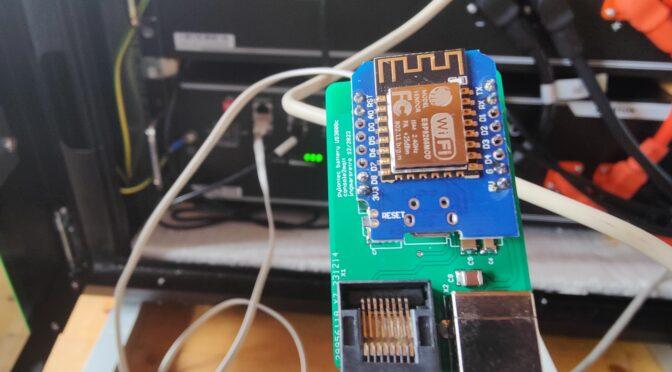
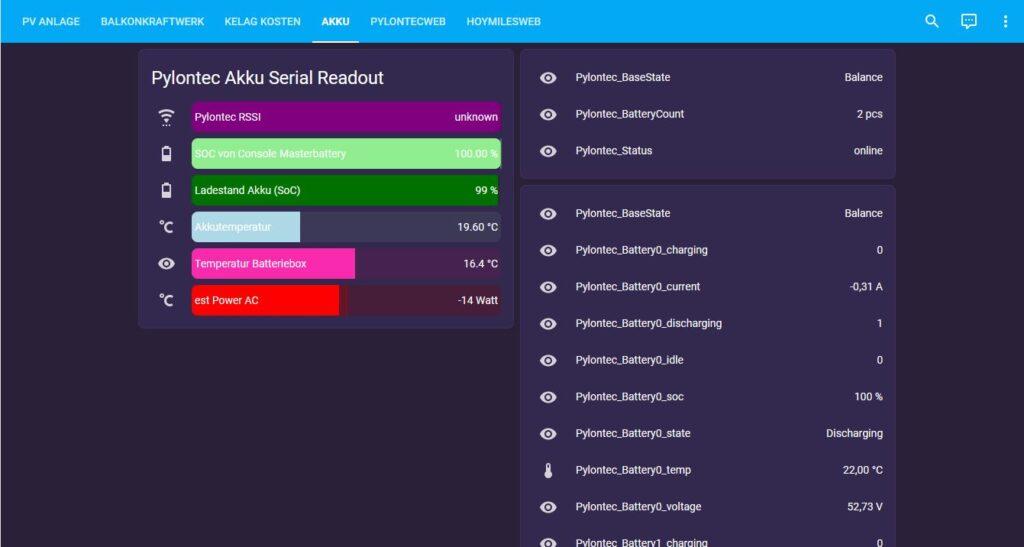
Kuente ich die platine kaufen.
Hallo und vielen Dank für die Beschreibung.
Besteht die Möglichkeit eine Platine bei dir/Ihnen zu kaufen?
Gruß
Georg
Ich hätte da auch Interesse.
Besteht die Möglichkeit?
Gruß
Rene
Hallo,
ich habe ganz oben im Beitrag einen Link mit den Gerberdaten der Platine zum Download eingerichtet.
Gruß
Hallo Ingmar,
Sehr schönes Projekt. Ich bin auch gerade dabei einen Pylontech Speicher in Betrieb zu nehmen und bin dabei über deine Platine gestolpert.
Besteht die Möglichkeit eine Platine bei dir zur erwerben oder sind die Gerber-Daten veröffentlicht? Selber Löten ist kein Problem. Über eine Rückmeldung würde ich mich sehr freuen.
Grüße Marcel
Hallo Marcel,
ich sende dir die Gerberdateien per Mail.
Grüße Ingmar
Hallo Ingmar,
würde das auch für die US5000 funktionieren? Die meisten Projekte/Anleitungen erwähnen das nicht so deutlich.
Danke
Tobias
Hallo Tobias, ich habe keinen US5000 Akku zum testen, aber vermutlich sind die Datenprotokolle annähernd gleich.
Hi, die Cyclen sieht man nicht?
Wie kann man diese sehen?
Hallo Ingmar
Ich habe diesen Beitrag aufmerksam gelesen und denke, dass das auch für mich sehr interessant ist. Leider bin ich nicht vom Fach.
Habe einen AC gekoppelten Solis s6-ea1p Inverter mit 2 Pylontech US5000 und kann leider über den Modbus keine detailierten Werte für die Pylons sehen. zB. einzelne Zellen, Cyclen , Temp.Batterie …
Meine Frage wäre, ob ich die vorgestellte Lösung bei Ihnen käuflich erwerben könnte oder ob Sie jemanden kennen, der das verwirklichen könnte.
Vielen Dank und viele Grüße
Wolfgang
Hallo Ingmar,
gibt es ein addon, wenn man die pylontech per serial usb direkt an den HA-Server angeschlossen hat ?
Hallo Ingmar,
Welchen Kapazität und Nennspannung haben die Kondensatoren C8 & C9?
Bei den Gerber Daten fehlt leider die Spezifikation der beiden Kondensatoren
C8 und C9 liegen direkt am 5V DC Eingang der Platine. Je nach Qualität der Eingangsspannung habe ich hier Platz für evtl. notwendige Entstör- bzw. Glättungskondensatoren gelassen.
Idealerweise sollte die Spannungsfestigkeit der Kondensatoren 10V ++ sein. C8 würde ich mit 10uF/10V und C9 mit 10nF/10V bestücken.